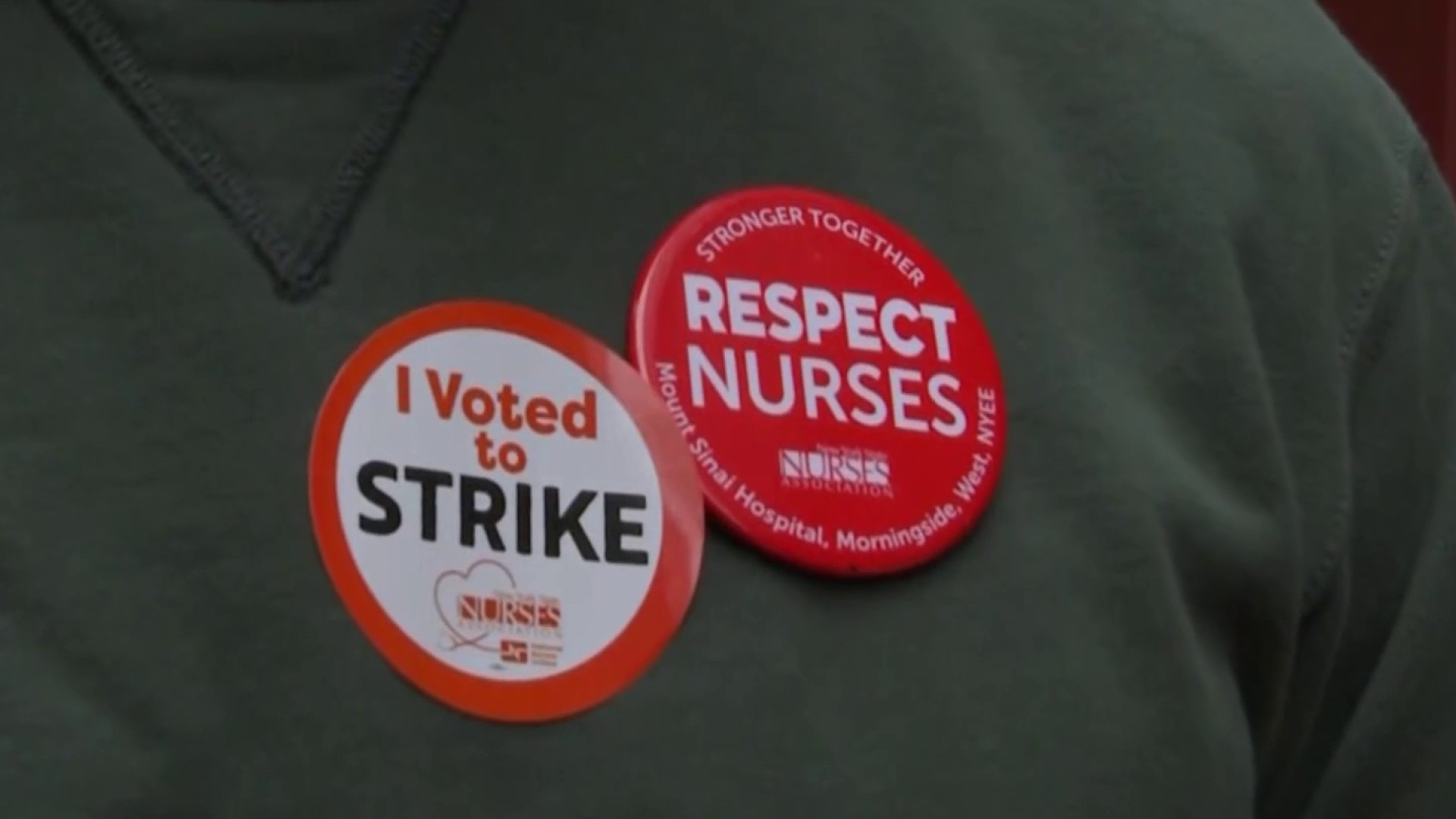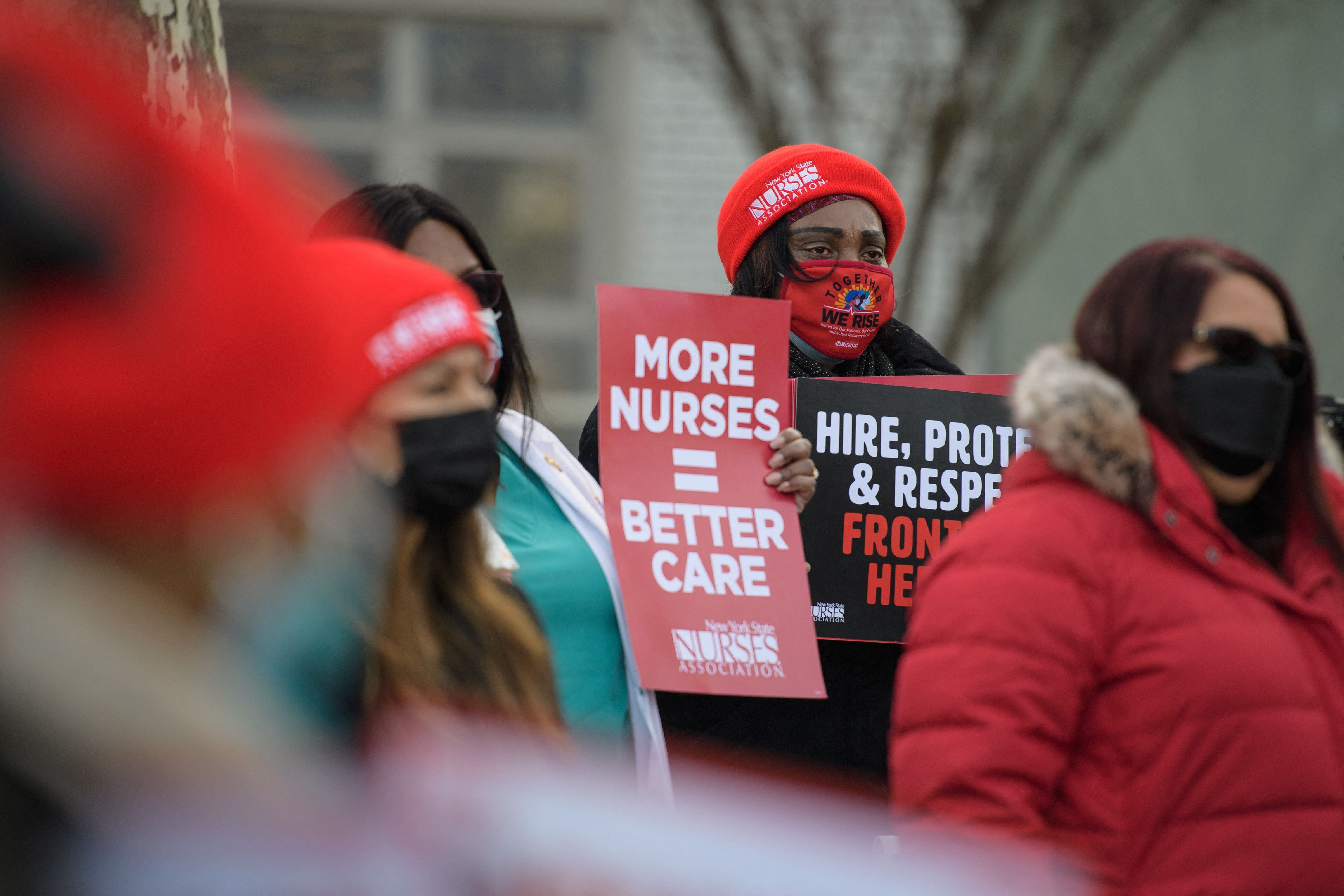LATEST UPDATE:
Time is running out, with just five days left from the possibility of New York City nurses going on strike at seven major local hospitals — but the nurses union says not all of those hospitals were at the negotiating table on Wednesday.
Hospital sources told NBC New York that beginning Thursday in preparation for a potential strike, hospitals will begin what they call "decanting" their facilities. That means they will start canceling elective procedures — including some fairly significant procedures — and discharging patients as early as clinically possible in an effort to get the patient count down.
Get Tri-state area news and weather forecasts to your inbox. Sign up for NBC New York newsletters.
Additionally, sources familiar with the situation said that Mount Sinai Hospital has requested that the FDNY divert ambulances away from one of their campuses, in anticipation of the strike. That diversion has not yet taken place however, and it wasn't clear if the fire department had approved the hospital's request.
Nurses have said that there has been some progress at some bargaining tables where hospitals are negotiating with their respective nurses, but not enough progress to avoid a strike — yet. It was not immediately clear why hospitals were taking breaks from the talks with a deadline looming, and answers provided to NBC New York from the hospitals were vague. Nurses, meanwhile, have said they want talks to continue around the clock, if necessary.
"Nurses feel abandoned and disrespected by their bosses," said nurse Nancy Hagans. "We held the hands of dying patients, set up last FaceTime calls so dying patients could say goodbye to their loved ones."
Seven private hospitals (Montefiore, Mount Sinai Hospital, Mount Sinai Morningside and West, Maimonides, BronxCare, Richmond University Medical Center and Flushing Hospital Medical Center) are on notice for a potential strike starting the morning of Jan. 9 — a move that would send already busy hospitals into full-on crisis mode, and potentially have a devastating impact on care.
"It could be an enormous public health calamity," Ken Raske of the Greater New York Hospital Association previously told NBC New York. He has described the mood as among hospital managers as "extremely apprehensive."
Each of the hospitals negotiates individually with their own nurses, so depending on how talks go, there could be no strikes at all, a single strike or as many as seven strikes.
The nurses union said there has been at least one sign of progress: All of the hospitals on the list except for Flushing Hospital have agreed to not cut health benefits.
"There has been some offers and progress but we are not there yet," said Hagans.
As of Wednesday, all eyes are on New York-Presbyterian Hospital and the nurses there. There was a tentative deal reached over the weekend that, if accepted, would give nurses 18 percent raises over the next three years, with added incentives to retain experienced nurses. There was also a promise to address chronic understaffing, which was the union's biggest complaint.
But there is a large caveat: NY-Presbyterian is widely considered to be the richest hospital in the city, and not all hospitals are in the same financial situation. While all the hospitals have said they are negotiating in good faith, some said they can't afford to pay as much — a big sticking point considering some hospital executives are paid in the millions.
Smaller so-called "safety net" hospitals are more reliant on lower reimbursement rates for the care they provide, like through Medicare or Medicaid. Some of the others on the list say they are hemorrhaging money, but nurses at those hospitals aren't buying the argument.
According to a source familiar with Mount Sinai's past talks, the hospital had previously offered nurses a deal that included 14 percent raises over four years — a deal that nurses rejected, and it was noticeably lower than the offer extended by NY-Presbyterian.
"It's not really up to us whether we walk out. It's up to the bosses," said Hagans.
While it remains to be seen whether the nurses at NY-Presbyterian will accept the offer, Montefiore Hospital said Wednesday that nurse representatives at their hospital had rejected a deal that mirrored the one NY-Presbyterian offered. A spokesperson for the hospital said that nurses were offered "an 18 percent wage increase over three years, fully funded healthcare for life, and a significant increase in registered nurses in the emergency departments, among other benefits."
That development may spell trouble for other hospitals given the financial landscape. According to the Montefiore spokesperson, NY-Presbyterian posted $200 million in profits in 2022 while Montefiore posted $200 million in losses. That sort of deal was considered potentially unattainable for other hospitals on the list, but now nurses at NY-Presbyterian may think twice about ratifying the deal they tentatively agreed to (voting began Tuesday night and concludes Saturday).
Gov. Kathy Hochul's office has said previously that they are "monitoring the situation." Sources said that both Hochul and NYC Mayor Eric Adams are getting regular daily updates on the talks. While the hospitals involved are all private, meaning neither Hochul nor Adams have any formal role, some have wondered whether they would step in to apply pressure or try to broker a deal.
NBC New York has learned that the other hospitals that have not reached agreements with their nursing staffs are starting to shell out tens of millions of dollars in nonrefundable down payments to have traveling temporary nurses on reserve — a huge expense they must shoulder, even if no strike takes place.
The GNYHA said doing so works against the interest of the nurses in the union because it forces hospitals to spend money that could go to the nurses — but it also increases the leverage of nurses once the strike notice is issued. One nurse involved in negotiations estimated the cost of trade nurses is around $10,000 a week per travel nurse. The New York State Nurses Association estimated that the mere threat of a strike has already cost as much as $32 million to temp agencies, a cost they said could surge to more than $90 million if the travel nurses have to fill in for five or six days.
"Our ERs are backed up, the tripledemic is raging," said Raske. "Even if one hospital would have a strike, it could ripple through the entire system."
The New York State Nurses Association has as many as 12,000 members threatening to conduct strikes at seven respective hospitals where contracts expired on Dec. 31.
The union says members are upset about staffing ratios at the local hospitals, contract proposals that they feel dramatically worsen their healthcare benefits (while paying big bonuses to executives), and Mayor Adams' recent move to forcibly hospitalize psychiatric patients. All of those elements have left workers overworked and burnt out.
"We're not able to clean the patient on time, not able to give medicine on time, no breaks," said Allen. "Burnout was real, so we leave the profession and go to work at a travel agency that's going to pay us more."
In a statement Monday, a spokesperson for Mount Sinai said that their bargaining teams "continue to make good-faith efforts to pursue a contract with NYSNA that is fair to our community and responsible with respect to the long-term financial health of our organization. Mount Sinai nurses deserve the best possible working environment, wages, and benefits, and we're tirelessly pursing these to all our employees' advantage."
The statement added that the hospital system is "prepared for staffing changes, and we will do our best to ensure our patients' care is not disrupted and will do everything possible to minimize inconvenience to patients."
The average salary for nurses in New York is $93,000, and $98,000 in NYC, nurses union and the GNYHA confirmed. However, there is a big disparity between nurse pay in private vs public hospitals, where salaries are almost $20,000 less.
All of this comes as the city deals with what is being called a tridemic - simultaneous and serious spikes in infections with COVID, the flu and the respiratory condition RSV.
The city has already issued an advisory (but not a mandate) suggesting that people go back to wearing masks indoors.



